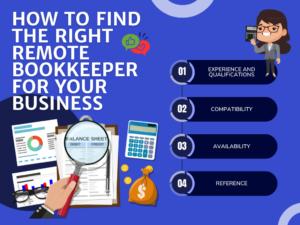

Quick Links
Quick Links
In the modern business world, having an experienced remote bookkeeper on your team is more important than ever. Without someone understanding the ins and outs of managing finances, you could be leaving yourself open to mistakes and errors that can cost you time and money.
However, hiring a bookkeeper doesn’t have to be complicated. This guide will find and hire a remote bookkeeper who can help you streamline your finances and take your business to the next level.
What Does a Bookkeeper Do?
A bookkeeper is responsible for maintaining financial records. This includes recording transactions, preparing reports, and reconciling accounts. A bookkeeper’s duties may also involve managing invoices and payroll.
Bookkeepers are an essential part of any business. They help to ensure that financial records are accurate and up-to-date. This allows companies to make informed decisions about their finances.
The Benefits of Hiring a Remote Bookkeeper
There are many benefits to hiring a remote bookkeeper to handle your finances. The most obvious benefit is cost savings. Hiring someone remotely means you don’t have to pay for their office space, equipment, or supplies.
Another great benefit of hiring a remote bookkeeper is the increased flexibility and freedom it affords you. A remote bookkeeper can work from anywhere in the world, which means they can be available at hours that suit your schedule and time zone. This is a massive advantage if you’re running a business that operates internationally.
Hiring a remote bookkeeper can help you tap into a global talent pool. There are many highly-skilled professionals out there who are willing to work remotely for a fraction of the cost of their on-site counterparts. Hiring a remote bookkeeper is worth considering if you’re looking for top-notch financial expertise without breaking the bank.
How to Find the Right Remote Bookkeeper for Your Business
As a business owner, you know that bookkeeping is essential to keeping your finances in order. But what if you don’t have the time or resources to do it yourself? Hiring a remote bookkeeper can be a great solution.
But how do you find the right person for the job? Here are a few things to keep in mind:
1. Experience and qualifications. First, you’ll want to ensure that your potential bookkeeper has the experience and qualifications to do the job well. Ask about their education, training, and professional experience.
2. Compatibility. Finding someone you get along with and who understands your business goals is essential. Be sure to ask about their communication style and whether they’re comfortable working with businesses in your industry.
3. Availability. Make sure your bookkeeper is available when you need them – especially during tax season! Ask about their availability and whether they offer any flexible scheduling options.
4. References. Finally, always ask for references from past clients before hiring anyone – this will give you peace of mind knowing that you’re working with someone reputable and trustworthy.
Questions to Ask When Interviewing Remote Bookkeepers
1. What accounting software do you feel most comfortable using?
2. How much experience do you have working with small businesses?
3. What are your thoughts on keeping track of expenses and invoices?
4. Do you have any experience preparing financial statements?
5. How would you handle discrepancies between what was recorded in the books and what happened?
6. Are you familiar with double-entry bookkeeping?
How Much Does a Remote Bookkeeper Cost?
A remote bookkeeper can cost anywhere from $500 to $5,000 per month. The exact price will depend on the bookkeeper’s experience, the number of hours they work, and the complexity of your business finances. Generally, you can expect to pay more for a remote bookkeeper than an in-house bookkeeper.
There are a few things to remember when budgeting for a bookkeeper. First, you’ll need to factor in the cost of any software or tools they need to do their job. Second, you’ll need to ensure you have enough money to cover their fees. And finally, you should be prepared for unexpected expenses, like if your bookkeeper needs to travel to your office for an on-site meeting.
Hiring a remote bookkeeper can save you money on overhead costs and allow you to get expert help with your business finances without breaking the bank. When done right, it’s a win-win situation for both parties involved! Check our pricing guide.
Things to Consider Before Hiring a Remote Bookkeeper
There are a few things you should consider before hiring a remote bookkeeper. Here are a few things to keep in mind:
1. What services do you need?
Before searching for a remote bookkeeper, you must determine what services you need. Do you need someone to handle your invoicing and receivables? Or do you need someone to take your payroll and employee expenses? Once you know what services you need, you can start narrowing down your search.
2. What is your budget?
Another essential thing to consider is your budget. How much can you afford to spend on a remote bookkeeper? Remember that the cost of living in different parts of the country (or world) varies, so make sure to factor that into your budget.
3. What are your requirements?
When looking for a remote bookkeeper, you will want a list of requirements they must meet. For example, do they need to have experience with Quickbooks? Do they need to be able to work specific hours? Having a list of requirements will make it easier for you to find the right person for the job.
Contact Us Today
Hiring a remote bookkeeper can be a great way to improve the accuracy and efficiency of your business’s finances. It is essential, however, to keep in mind that you should take time to research potential candidates thoroughly and make sure they are qualified to do the job right. With careful consideration and due diligence, you will be able to find an experienced and reliable remote bookkeeper who can help you maintain healthy financial records.
